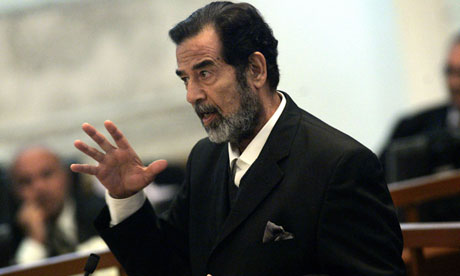A decade after Saddam was overthrown, why are some progressives still loath to celebrate his demise?

Saddam Hussein during his trial in 2006. 'I can guarantee that you will not hear much about his atrocities in the coming weeks,' writes Nick Cohen. Photograph: David Furst/AFP/Getty Images
Every few months a member of the audience at a meeting I am addressing asks whether I regret supporting the overthrow of Saddam Hussein. The look in their eyes is both imploring and accusatory – "surely you must agree with me now", it seems to say. I reply that I regret much: the disbanding of the Iraqi army; a de-Ba'athification programme that became a sectarian purge of Iraq's Sunnis; the torture of Abu Ghraib; and a failure to impose security that allowed murderous sectarian gangs to kill tens of thousands.
For all that, I say, I would not restore the Ba'ath if I had the power to rewind history. To do so would be to betray people who wanted something better after 35 years of tyranny. If my interrogators' protesting cries allow it, I then talk about Saddam's terror state and the Ba'ath's slaughter of the "impure" Kurdish minority, accomplished in true Hitlerian fashion with poison gas.
My questioners invariably look bewildered. The notion that, even if they opposed military intervention, they had obligations to support those who suffered under a regime which can be fairly described as national socialist had never occurred to them. No one can say that time's passing has lessened their confusion.
It's 10 years since the overthrow of Saddam and 25 since he ordered the Kurdish genocide. I can guarantee that you will not hear much about Saddam's atrocities in the coming weeks. As Bayan Rahman, the Kurdish ambassador to London, said to me: "Everyone wants to remember Fallujah and no one wants to remember Halabja." Nor, I think, will you hear about the least explored legacy of the war, which continues to exert a malign influence on "liberal" foreign policy.
Iraq shocked liberals into the notion that they should stay out of the affairs of others. Of itself, this need not have been such a momentous step. A little England or isolationist policy can be justified on many occasions. There are strong arguments against spilling blood and spending treasure in other people's conflicts. The best is that you may not understand the country you send troops to – as the Nato governments who sent troops to Iraq did not. But unless you are careful you are going to have difficulties supporting the victims of oppressive regimes if you devote your energies to find reasons to keep their oppressors in power. Go too far in a defence of the status quo and the idea soon occurs to you that an oppressive regime may not be so oppressive after all.
Liberals are always the first to walk into that trap. A conservative nationalist has few problems saying: "My country comes first. If foreigners are in trouble, that's their lookout." Liberals need to dress isolationism in the language of morality. They need to feel righteous, especially when they are being selfish, and nowhere more so than in the Obama administration.
Sharp operator and orator though he is, it is hard to imagine Barack Obama beating Hillary Clinton without the help Iraq gave to his 2008 campaign for the Democratic nomination. Since coming to power, he has proved the truth of Karl Marx's warning in the 18th Brumaire that "the beginner who has learned a new language always translates it back into his mother tongue".
Obama learned that George W Bush's foreign policy was a disaster, and translates each new crisis back into the language of his political childhood. If Bush was against dictatorships, Obama would "reset" relations with Russia and Iran and treat them as partners. The failure of his initiatives never deters him. Despite his efforts, Russia remains a mafia state and Iran remains a foul theocracy determined to acquire the bomb. Their peoples, naturally, are restive. Russians demonstrate against Putin's rigged elections. The Iranian green movement tries to overthrow the mullahs. But Obama and the wider tribe of western liberals have little to say to them. The example of Iraq taught them that it is dangerous to worry too much about oppression, so they treat popular revolts that are liberal in the broad sense with indifference and embarrassment.
Russians and Iranians are not alone in noticing the reactionary strain in western "progressive" thinking. The forlorn figure of John Kerry had to beg Syrian opposition leaders to meet him, only to prove to them that their initial instinct to stay away was well-founded. While Iran, Russia and Hezbollah engage in illiberal intervention on Assad's behalf, Kerry made it clear that the Obama administration is determined that there should be no liberal intervention in the form of arms for the opposition or a no-fly zone. Even David Cameron is keener on taking practical steps to prevent a catastrophe in the Levant than this, and when Syrians can receive a fairer hearing from a shire Tory than an American "progressive" you should have the wit to realise that a sickness has taken hold.
So deep has it penetrated that Arab liberals now want nothing to do with the supposed leader of the world's liberal left. In an open letter to Obama, Bahieddin Hassan of the Cairo Institute for Human Rights Studies explained the hard struggle he and his comrades were fighting against the Muslim Brotherhood. The police murdered demonstrators, he told the president. Theocratic thugs raped women activists – "to break the political will of the victims through profound degradation". Yet, he noted, the Obama administration continued to praise the Muslim Brotherhood and patronise its liberal opponents.
Hassan had met Obama in the White House. But he had no illusions left about winning his support. All he asked was that the president's "liberal" officials bite their tongues and stop providing political cover for reactionaries. If "they cannot speak the truth about what is happening in Egypt," he said, "they should keep silent."
Shut up and stop pretending to be our friends. What an epitaph that makes for the 21st-century's first generation of "progressives". From the start, I wrote that their parochialism would lead them into double-dealing, but Ian McEwan put it better than I ever could. In his Saturday, set on the day of the great anti-war march of 2003, he has the hero, Henry Perowne, argue with his daughter. Perowne, a surgeon, has treated the victims of Saddam's torture chambers and asks her: "Why is it among those two million idealists today I didn't see one banner, one fist or voice raised against Saddam."
"He's loathsome, it's a given," she replies.
"No, it's not," says Perowne. "It's a forgotten. Why else are you all singing and dancing in the park?"

No comments:
Post a Comment